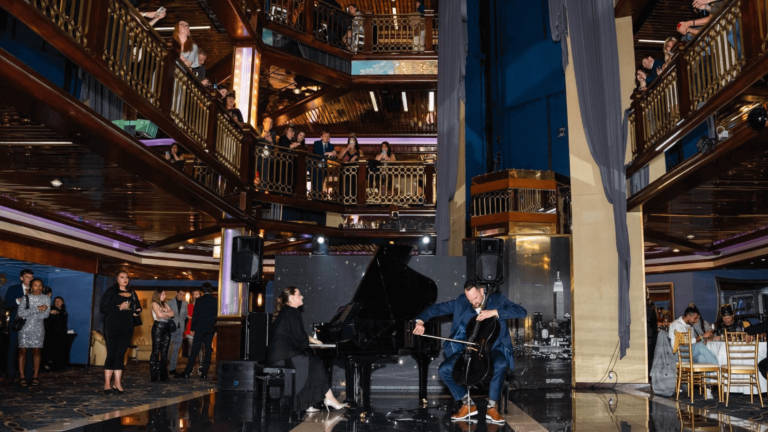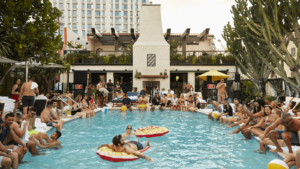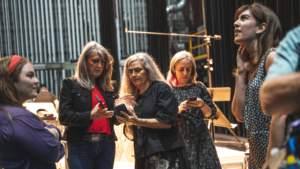To cook up a mindblowing event, you need four main ingredients: one cup of enthusiastic attendees, a dash of creativity, a chunk of event promotion, and two overflowing cups of the right venue.
When creating an event masterpiece, the venue is the ‘make or break’ component.
So, how do you find a venue for an event that says ‘we nailed it’?
Eventbrite lives and breathes events — from venue scouting to event promotion, we love it all. We’ve helped event creators from all over the world reach over 83 million eventgoers, so we’ve learned a thing or two about how to find a venue for an event that feels perfect.
In this article, we’ll show you our tried and tested process for finding the right venue for your event and provide some helpful software solutions that’ll cut your research time in half.
Finding the right venue step-by-step
Stage 1: List your core considerations
Stage 2: Conduct a deep dive market research
Stage 3: Use industry connections
Stage 4: Consider attendees’ emotional experience

Stage 1: List your core considerations
The first step in finding a knockout venue is to consider the functionality, accessibility, and legal requirements your event demands.
At this stage, don’t worry about deciding on the aesthetic or vibe of a venue; focus on the essential requirements your venue needs to run your event successfully.
Here are some key considerations:
- Size needed to accommodate your attendees
- Accessibility needed for your target audience and in which location would be most appealing
- Equipment required for the activities in your event, such as lighting equipment or a performance stage
- Amenities you’ll need to make your event happen, such as adequate toilets, catering options, a bar, etc.
- Budget you can allocate to your venue
- Furniture necessary for your activities
- Storage needed for extra equipment and furniture
- Legal compliance, such as having restrooms in a seated restaurant that serves alcohol, licenses, etc.
To simplify your search for ‘the one,’ we’ve compiled a comprehensive list of the most important aspects to look for in a venue into a downloadable checklist.
For instance, let’s say you’re planning a silent party, like The Millennium Age, where attendees hear music through headphones rather than speakers.
In this case, your essential requirements would be bathroom facilities and a large dance floor for attendees to boogie. But you may have additional requirements, which you’ll have to list in order of priority, such as lockers, a bar, a stage for the (silent) DJ, etc.
If the venue cost eats too much into your profits, but selecting a different type of venue will hinder your ability to deliver a high-quality event, it might be time to turn to a source of financial support for help, such as an event sponsor.
On the other hand, this is also an opportune moment to carefully assess your core needs and explore ways to reduce expenses (and boost profits). For example, you might find that downsizing the venue and limiting attendee numbers will allow you to increase ticket prices while maintaining your vision.
Laws and regulations of venue choice
Before moving on to stage two, consider any laws and regulations that could impact your venue choice. For example, if you’re hosting a party, festival, or music performance, you’ll likely want to serve alcohol at your event. Therefore, you may need a venue with an ‘on-premises retailer’ liquor license or apply for a ‘festival’ license.
Similarly, if you’re looking at event venues in more secluded or suburban areas, you might also need to consider how noise ordinances will impact your event.
Stage 2: Conduct a deep-dive market research session
Now that you know what you need, it’s time to move on to the fun part: finding a unique venue to blow your audience’s minds.
We believe that the best approach to market research is to start with a broad search and then use a strict process of elimination to narrow down your options to the top three choices.
As you conduct your market research in phase two, we recommend creating a Google sheet for potential venue options.
List all of the key components of the venue, such as:
- The establishment’s name
- Location and proximity to your target audience’s primary demographics
- Rental price
- Any industry connections you have with ties to the venue
- Potential discount codes or areas of price negotiation
- Key elements of the venue, such as what facilities it offers
- One notable feature of the venue that makes it appealing
- General remarks about the ambiance and ‘vibe’ of the venue
- The venue’s level of accessibility and functionality

1. Use venue finders to find local event venues: Eventective
Use a venue finding service or search directory to find venues in your local area that meet your criteria from phase one.
Software like Eventective can search for venues suitable for parties, meetings, and more by filtering your search based on criteria such as location, pricing, and availability.
Although you can use the website to connect with venues and book events, at this stage, you want to focus on finding many options you can whittle down.
For example, if you’re a creator like The Phoenix Club, Inc., looking for a venue to host a conference event with 150+ attendees, you could search for suitable meeting rooms, outdoor courtyards, or even bars that meet your core criteria.
Add 20–30 potential venues to your sheet, and include all the key information in the document and a link to its Eventective page.

2. Perform competitor research: Eventbrite
To narrow your list and determine which type of venues are popular with your target audience, perform a competitor analysis using Eventbrite’s marketplace.
Search for events similar to yours and aspirational event creators to find out which venues they’re using to draw in audiences. Do this by turning on your precise location and searching for relevant types of events or clicking on the pre-assigned categories Eventbrite offers, such as ‘Nightlife.’
One of the best features of Eventbrite is its intelligent recommendation system that suggests events based on your searches and preferences, so the more you search, the more accurate the recommendations.
At this stage, you want to see if event creators in your area are using your original choices. If certain venues keep popping up, it can be a sign that they are open to collaborations and popular among attendees.
You’ll also want to figure out commonalities between the venues top creators are using, like if they have a distinguishably marketable feature or are centrally located. For example, event creators looking for a venue for an upcoming music performance in Idaho could look at top creators like Duck Club to see which venues they frequently use.
As you go, list your choices in order of interest. With the information you’ve gathered, you should be able to add a few venues to your master list and cut some down, narrowing it down to around 10 options.
Find your dream venue today.

3. Figure out what’s trending: Instagram, TikTok, and Reddit
One of the best ways to find ‘hidden gems’ and innovative venues is by leveraging the power of social media.
Platforms like Instagram, TikTok, and Reddit can offer unique insights into what your audience values in a venue and can showcase out-of-the-box uses of spaces that you might not have considered otherwise.
For example, the New York Book Club is a bar in New York that has ‘blown up’ on TikTok with its unique ambiance and aesthetic. For an event creator looking to host a small, community-driven event, reaching out to this bar for potential collaboration could be a great way to attract attendees and leverage the venue’s marketing potential.
Put on your investigator hat and look for hashtags related to your event type, scour comments, and find Reddit threads that mention venues trending with local residents.
Stage 3: Use industry connections
Once you have your top-tier list of venues, it’s time to draw on your community of industry connections.
Reach out to colleagues you’ve worked with in the past, performers, vendors — anyone who might have a lead. This is especially handy if you’re out late and looking for a last minute event space.
Give them your list of venues and see if they have any past experiences with any of them. If they have, inquire about the quality of their experience and ask if they have any contacts in the venue you could contact.
These contacts could be valuable in negotiating a discounted rate or simply ‘name-dropping’ to help prove you’re a trustworthy event organizer.
If you’re still establishing yourself in the events industry, you could also join a Facebook events group like EventProfs Mastermind to ask for advice on your list of venues.

Stage 4: Consider attendees’ emotional experience
The last piece in the puzzle is to consider the perceived value of your event and the emotional experience of your attendees.
Event venues are a great way to create an emotionally impactful and memorable experience for your attendees.
Ask yourself: What core offerings does my venue need to have in order for it to boost the perceived value of your event?
For example, La Cage puts on a ‘traditional Hollywood’ at The Hollywood Roosevelt. Not only is The Hollywood Roosevelt an ‘iconic’ venue but it’s also attached to the ‘golden age of cinema’ with famous stars like Marilyn Monore having frequently visited the hotel.
This creates an ‘authentic’ and truly unique experience for their audience, helping to enhance the event’s perceived value in the attendees’ eyes.
From your final choices, highlight which ones you believe will make a lasting impact on your audience. If none of them fit, then go back to your original list and start the process again.
However, if you think you’ve completed your search, simply grab the Eventective link for your chosen venues and contact the owners by email.
We recommend emailing your top three choices at least 8-9 months before your event to give yourself the best chance at securing an incredible venue!

Find a venue that blows your audience away
The location of your venue is only one piece of the puzzle — the atmosphere, amenities, and overall vibe of the space you select to host your event can either elevate it to new heights or detract from its success.
That’s why you need to choose wisely.
By using an event marketplace like Eventbrite, you can find venues that have been used by other event creators, just like you. This can give you peace of mind, knowing that you’re selecting a venue with a proven success track record.






